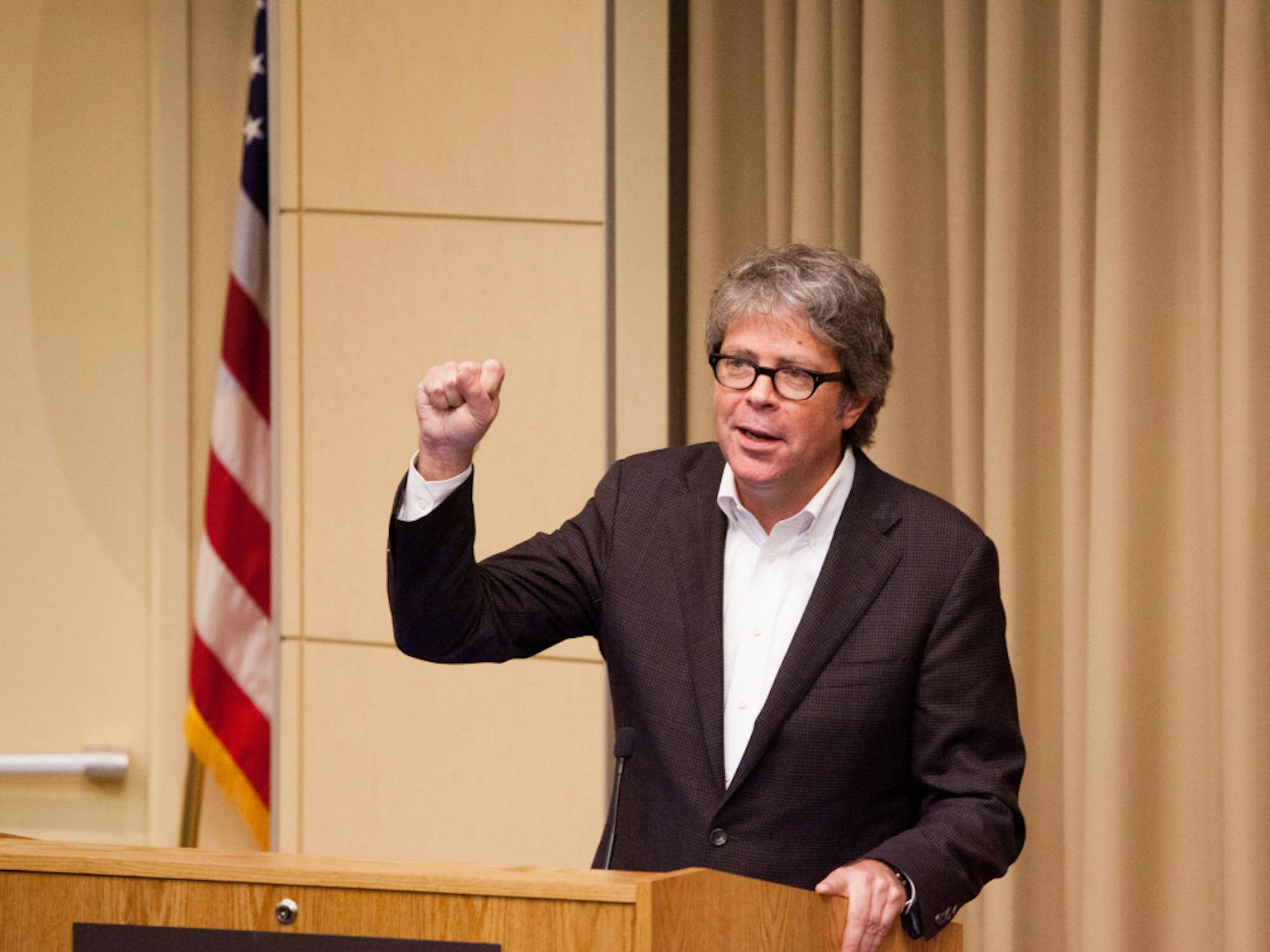Jonathan Franzen, award-winning American writer, presented a lecture titled "Storytelling and the Modern World," to the Tufts community last night. The lecture, which detailed his career, was sponsored by the Center for the Humanities at Tufts (CHAT).
Franzen, best known for his 2001 novel "The Corrections" -- the winner of a National Book Award, a James Tait Black Memorial Prize and a finalist for the Pulitzer Prize for Fiction -- has been recognized for his work as a novelist and essayist.
Director of CHAT Jonathan Wilson introduced Franzen and underscored the enduring importance of the issues Franzen covers in his work.
Franzen began by explaining that he would conduct the lecture by asking himself questions that are mostly challenging and that he does not get asked during his time doing interviews.
"I’ve had to do a lot of interviews in the past 15 years -- it's kind of what you do as a writer," he noted.
The first question Franzen proposed asked him about his favorite joke.
"No one has ever asked me this question," he said, and proceeded to tell the joke to the audience.
Next, Franzen asked himself about his own religious views, explaining first that he grew up attending a "nice liberal Protestant church in the Midwest" and was involved in Christian fellowship for six years until graduating high school. He explained that after starting college, he became increasingly interested in literature and later began writing.
"Little by little, all of that energy from my youth got poured into the idea that literature could be my religion," he said.
Franzen underscored the link between personal development in religion and his motivations for becoming a writer.
"Writing turned out to be a wonderful vehicle for personal growth," he said.
During his time studying literature, he highlighted Flannery O'Connor and Fyodor Dostoevsky as notable inspirations, given their writing of what he called "religious art."
Franzen then spoke about the role that religion plays in human life, noting its importance in helping to make sense of human existence and death.
"I think we’re kind of built for religion, because life is just crazy -- you exist and then you don’t exist, and you didn’t exist before, and there’s just no way of making any sense of that," he said.
Religion also can bring a sense of duty and hope to one's life, as well as some sense of meaning, according to Franzen.
"Yes, I am a religious person," he finally concluded.
Franzen's third question concerned the role that envy and competition have played in his life as a writer.
"To be a writer is to be envious I think,” he said. ”Somebody always has what you’re not getting."
He explained that he wrote his first novel in his early '20s living in Somerville when he first began to feel envy for other writers, a feeling he had not experienced in college. He said that he first began to envy his contemporaries who had received some attention, noting that the targets of this envy changed as his work began to be published.
Franzen underscored that the sense of hatred that arrives with envy "comes with moral judgment attached," explaining that he looked to find the negative traits of writers whom he envied.
As an example, he spoke about his friendship with author David Foster Wallace, explaining that their friendship and competition helped allay his sense of envy.
"I think competition is good, actually, and competition with David particularly sustained me," Franzen said.
In his next question, he asked about his worst experiences on book tours, describing a number of circumstances giving book readings across the United States and his "glaring lack of media training."
Another question Franzen asked himself was about how he has changed due to fame.
"I’m trying really hard not to be changed at all," he said.
Franzen also analyzed fiction's role in literature today.
"The primary purpose of fiction is not to represent, it's not necessarily to empathize, it's certainly not to make the world a better place," he said. "I think the primary purpose of fiction is to entertain."
Franzen questioned whether it is fair to generalize his experiences or problems to the general public, but said that he knows what is like to be afraid of getting sick or to be afraid of dying.
"These things are really universal, and they cut across everything," he explained.
His next question dealt with things he has said publicly and wished he hadn't, and things he wished he had said but didn't.
"It’s a small exaggeration only to say I became a writer because I could never say in the moment the thing that needed to be said," Franzen explained.
His final question concerned a piece he had published that he wishes he hadn't. He spoke about an event that for him was particularly difficult -- an essay he ran in The New Yorker about a traumatic childhood experience.
The event was followed by a question and answer session open to the public and a book signing opportunity.
Author Jonathan Franzen discusses career, life as a writer

Franzen spoke about his rivalries with other authors.





